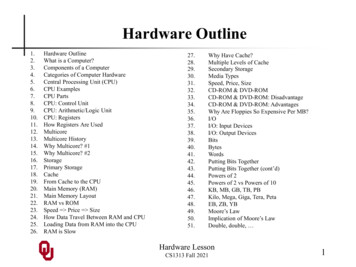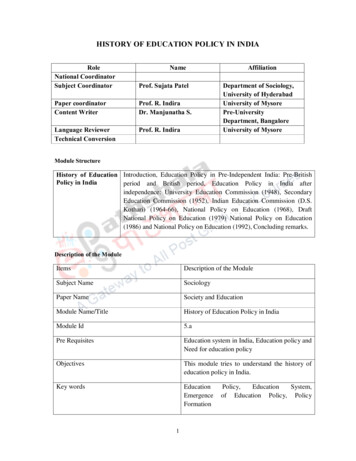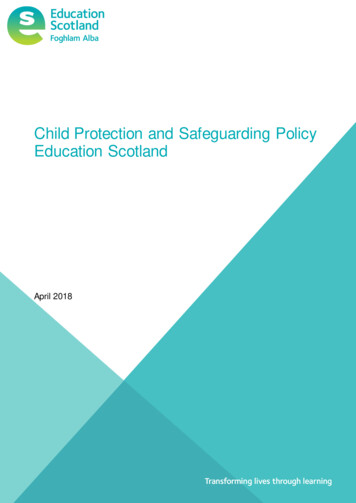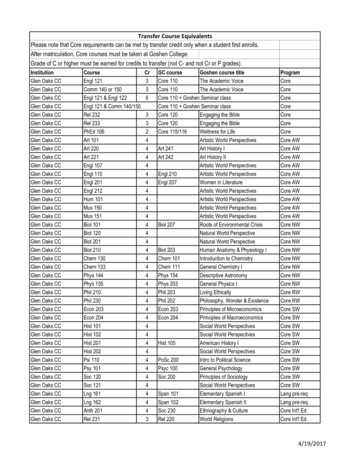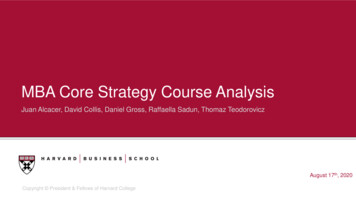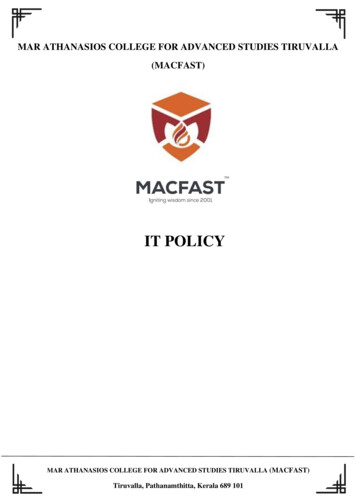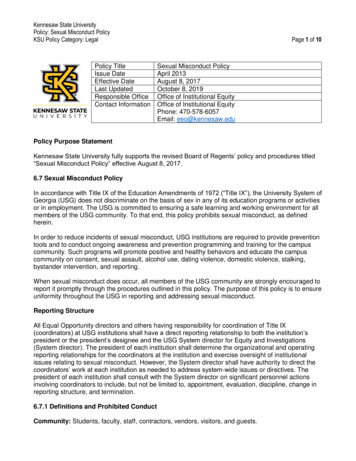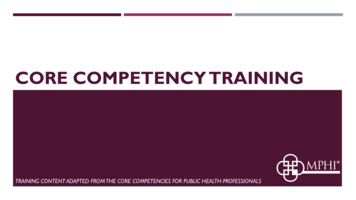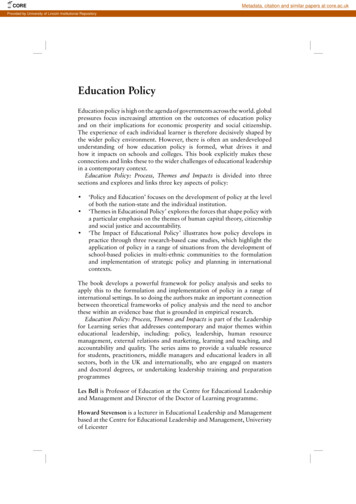
Transcription
COREMetadata, citation and similar papers at core.ac.ukProvided by University of Lincoln Institutional RepositoryEducation PolicyEducation policy is high on the agenda of governments across the world. globalpressures focus increasingl attention on the outcomes of education policyand on their implications for economic prosperity and social citizenship.The experience of each individual learner is therefore decisively shaped bythe wider policy environment. However, there is often an underdevelopedunderstanding of how education policy is formed, what drives it andhow it impacts on schools and colleges. This book explicitly makes theseconnections and links these to the wider challenges of educational leadershipin a contemporary context.Education Policy: Process, Themes and Impacts is divided into threesections and explores and links three key aspects of policy: ‘Policy and Education’ focuses on the development of policy at the levelof both the nation-state and the individual institution.‘Themes in Educational Policy’ explores the forces that shape policy witha particular emphasis on the themes of human capital theory, citizenshipand social justice and accountability.‘The Impact of Educational Policy’ illustrates how policy develops inpractice through three research-based case studies, which highlight theapplication of policy in a range of situations from the development ofschool-based policies in multi-ethnic communities to the formulationand implementation of strategic policy and planning in internationalcontexts.The book develops a powerful framewok for policy analysis and seeks toapply this to the formulation and implementation of policy in a range ofinternational settings. In so doing the authors make an important connectionbetween theoretical frameworks of policy analysis and the need to anchorthese within an evidence base that is grounded in empirical research.Education Policy: Process, Themes and Impacts is part of the Leadershipfor Learning series that addresses contemporary and major themes withineducational leadership, including: policy, leadership, human resourcemanagement, external relations and marketing, learning and teaching, andaccountability and quality. The series aims to provide a valuable resourcefor students, practitioners, middle managers and educational leaders in allsectors, both in the UK and internationally, who are engaged on mastersand doctoral degrees, or undertaking leadership training and preparationprogrammesLes Bell is Professor of Education at the Centre for Educational Leadershipand Management and Director of the Doctor of Learning programme.Howard Stevenson is a lecturer in Educational Leadership and Managementbased at the Centre for Educational Leadership and Management, Univeristyof Leicester
Related titlesChange Forces with a VengeanceMichael FullanDeveloping the ICT Capable SchoolSteve Kennewell, John Parkinson and Howard TannerDiary of a DeputySusan M. TranterEffective Leadership for School ImprovementChristopher Chapman, Christopher Day, Mark Hadfield, Andy Hargreaves,Alma Harris and David HopkinsImproving Induction: Research-based Best Practice for SchoolsMaxine Bailey, Sara Bubb, Ruth Heilbronn, Cath Jones and MichaelTotterdellLeadership for Change and ReformRobin Brooke-Smith and Michael FullanManaging Teacher Appraisal and PerformanceCarol Cardno and David MiddlewoodSchool Leadership in the 21st CenturyBrent Davies and Linda EllisonSelf-evaluation in the Global ClassroomJohn MacBeath and Hidenori Sugimine
Learning for LeadershipSeries Editors: Les Bell, Mark Brundrett and Clive DimmockEducation Policy: Process, Themes and ImpactLes Bell and Howard StevensonLeading Learning: International PerspectivesAnn Briggs, Hugh Busher and Rosie SageSchool Leadership for Quality and AccountabilityMark BrundrettStrategic Marketing for Education: An Integrated Approach to LeadershipNick FoskettHuman Resource Management in Education: Principles, Policy andPracticeBernard BarkerLeadership and Learning: Process, Themes and ImpactClive Dimmock
Education PolicyProcess, Themes and ImpactLes Bell and Howard Stevenson
First published 2006by Routledge2 Park Square, Milton Park, Abingdon, Oxon OX14 4RNSimultaneously published in the USA and Canadaby Routledge270 Madison Ave, New York, NY 10016Routledge is an imprint of the Taylor & Francis Group 2006 Les Bell and Howard StevensonTypeset in Sabon byHWA Text and Data Management, Tunbridge WellsPrinted and bound in Great Britain by?APrinter LtdAll rights reserved. No part of this book may be reprinted or reproduced or utilised in any form or by any electronic, mechanical, orother means, now known or hereafter invented, including photocopying and recording, or in any information storage or retrieval system,without permission in writing from the publishers.British Library Cataloguing in Publication DataA catalogue record for this book is available from the British LibraryLibrary of Congress Cataloging-in-Publication DataA catalog record for this book has been requestedISBN10: 0–415–377873–7 (hbk)ISBN10: 0–415–377872–2 (pbk)ISBN13: 9–78–0–415–377873–4 (hbk)ISBN13: 9–78–0–415–377872–0(pbk)
This book is dedicated to Sue and Kate in appreciation oftheir tolerance and support and to Steven, Georgina and Tomwith best wishes for their future
ContentsList of illustrationsSeries editors’ forewordAcknowledgementsIntroduction: education policy, themes and impactxixiixiv1PART IPolicy and education1 What is education policy?2 Investigating the sites of policy development5725PART IIThemes in educational policy393 Educational policy and human capital414 Education policy, citizenship and social justice585 Accountability, autonomy and choice74PART IIIThe impact of educational policy956 Policy, strategy and leadership(with Daniel Chan)97
xContents7 Reconciling equity and economy: a case-study ofEducational Action Zones in England1208 Citizenship and social justice: developing educationpolicy in multi-ethnic schools1389 Conclusion160BibliographyIndex168186
IllustrationsFigures1.1 Policy into practice: a model1.2 A linear model of policy development3.1 Policy into practice: human capital4.1 Policy into practice: citizehsip and social justice5.1 Policy into practice: accountability6.1 Policy into practice: strategic planning7.1 Policy into practice: the EAZ experience8.1 Leadership in multi-ethnic schools8.2Policy into practice: leading multi-ethnic schools131645659111512345150Tables1.1 Analysis for policy and analysis of policy8.1 Case-study schools – details and background9.1 Policy into Practice – a composite model10143162
Series editors’ forewordLeadership and learning are proving enduringly crucial concepts in contemporary debates on policy and practice regarding improving performance andachievement in education. In this Series, we marry the two. Leadership ineducation is, after all, about steering educational organizations in ways thatimprove student learning. In putting this Series ‘Leadership for Learning’together, the Editors had a number of aims. First, they saw the need for acollection of books that addressed contemporary and major themes withinEducational Leadership and Management. Secondly, the approach to thesethemes needed to be both scholarly and up to date in engaging contemporaryacademic debates and practitioner problems and issues. Thirdly, promotionof a scholarly approach in turn meant that we attached considerable importance to coherence of argument in each volume. This was more achievable,we decided, by having a series of authored and co-authored rather than edited books. Fourthly, the series should be research-based, with discussionwhere possible grounded in empirical evidence and contemporary research.Fifthly, the volumes needed to capture and engage contemporary practicalproblems and issues experienced by practitioners in all sectors of education –primary, secondary, post-compulsory and even higher education. Since manyof these problems and issues cross international boundaries, the series shouldhave an international appeal. Finally, the practical problems and issues werebest engaged, we believed, through a rich variety of lenses, including competing and complementary theories and concepts, some of which might becontested. We wanted to capture Educational Leadership and Managementas a field riveted with a rich diversity of theory, research evidence, views andinterpretations – but above all, a field of great importance to improving thequality of educational organizations and the performance and achievementsof students and professionals who work within them.In achieving the above aims, we have identified six themes, each of whichprovides the basis for a volume. In part, the conceptualization of the textsand their themes addresses the emerging international agenda for leadershipdevelopment – both in academic institutions and by national accreditationbodies such as those in the UK, USA and Australasia. The six are: policy,leadership, human resource management, external relations and marketing,
Series editors’ foreword xiiilearning and teaching, and accountability and quality. To write the volumes,we have assembled an impressive list of authors with the proven experience,expertise and ability.The intention underpinning the Series is to provide a valuable learningresource for a wide and diverse set of people. The volumes are directly relevant to students and educational leaders, both in the UK and internationally,many of whom are engaged on masters’ and doctoral degrees such as thoseorganized by the University of Leicester’s Centre for Educational Leadershipand Management (CELM). More widely, they will appeal to academics andresearchers in education and to a large practitioner body of teachers, middle and senior managers, including headteachers and principals in primary,secondary, post-compulsory and higher education in many countries. Largenumbers of aspiring and experienced leaders undertaking leadership training and preparation programmes, such as those of the National College forSchool Leadership in the UK, will also find the Series invaluable. We dedicatethis Series to all leaders and learners and those willing to lead by learning.The focus of this the first text in the series is on policy in education. Thisis a substantial and scholarly analysis of a topic that has been comparativelyneglected in recent years. The authors, Les Bell and Howard Stevenson, bothof the Centre for Educational Leadership and Management at the Universityof Leicester, create an impressive conceptual analysis of the topic which, inturn, informs and illuminates an exploration of their own extensive research.The writers argue that it is vitally important to recognize that educationalleadership is shaped decisively by the wider social and political environment,and by the power relations within an organization. A key purpose of thevolume is, therefore, to explore the relationships between policy development at institutional level, the impact of local context and the influence onthese of the macro-policy environment. Those in leadership positions face aparticular challenge as they often represent the interface between the organization and the external policy environment. Thus the importance of policyon leadership and the role of leadership in mediating policy is manifest in thewhole of this wide-ranging text.The series editors are delighted that the first text in the series sets out achallenging and articulate analysis of policy issues both nationally and internationally. They are confident that this text will provide a theoretical framework and benchmark for the subsequent texts in the series.Clive Dimmock, Mark Brundrett and Les Bell
AcknowledgementsWe would like to acknowledge the help given to us in writing this book byall our colleagues at the Centre for Educational Leadership and Management, School of Education, University of Leicester. We are very grateful toBernard Barker and Ann Briggs for their perceptive comments on earlierdrafts. Thanks are also due to our students for their helpful suggestions. Weare especially grateful to Kusi Hinneh, Peter Makawa, Joshu Mose, SylvesterMunyenyembe, Beatrice Uchenna Amadi-Ihunwo, John Rutayisire, BeverleyTopaz, Christina Xie and our many students in Hong Kong, Malaysia andSingapore.We are especially grateful to our friend and colleague in Hong Kong,Daniel Chan, who gave us access to his research data, gave us permission topublish his work and contributed to the writing of Chapter 6. Penny Brownhas provided us with detailed critical yet supportive comments on variousdrafts. We have benefited from her considerable proofreading skills and hertechnical support in helping us to prepare the final manuscript. We are verygrateful for all her hard work on our behalf. We would also like to thankSandra di Paulo for helping us to copy and print the various drafts of thisbook and the series editors Mark Brundrett and Clive Dimmock for encouraging us to write this book in the first place.Much of the material in Chapter 3 was presented at the Athens Institute for Educational Research Conference and was subsequently publishedas Bell, L. (2004a) ‘Throw Physic to the dogs. I’ll none of it! Human Capitaland Education Policy – An Analysis’ in Lazaridou, A. (ed.) ContemporaryIssues on Educational Administration and Policy Athens Institute for Education and Research, 2004: 187–208. We are grateful for permission to usethat material in this volume. An earlier version of Chapter 6 was presentedin a paper, ‘The role of principals in strategic planning in primary schools inHong Kong and England: a comparison’ at the Commonwealth Council forEducational Administration and Management Regional Conference, Educational Leadership in Pluralistic Societies Hong Kong and Shanghai, 20–26October 2004 with Daniel W. K. Chan and was published in InternationalStudies in Educational Administration in September 2005. The researchon which Chapter 6 is based was partly funded by the National College for
Acknowledgements xvSchool Leadership (NCSL) International Fellowship Scheme. We are grateful for this support. We are also grateful for the permission of the journal’seditors to use the material in this volume. Chapters 7 and 8 both draw onfunded research initiatives and we are grateful to the EAZ that is the focusof Chapter 7, and to the NCSL in Chapter 8, for their support and co-operation with these projects. Particular thanks go to our colleagues in both theseventures – Phil Hingley (EAZ) and Clive Dimmock, Brenda Bignold, SaeedaShah and David Middlewood (NCSL).
IntroductionEducation policy, themes and impactThis book is about educational policy but it is not an educational policy bookin the traditional sense. It is recognized that:There was a time when educational policy as policy was taken forgranted Clearly that is no longer the case. Today, educational policiesare the focus of considerable controversy and public contestation Educational policy-making has become highly politicised.(Olssen et al. 2004: 2–3)Nevertheless, this book does not seek to explore in detail the extensivephilosophical and ideological underpinnings that have shaped educationalpolicy over time although it does consider briefly liberalism, neoliberalismand the emergence of the new right. Nor does this book examine in detailgovernmental policy-making processes. It does not explore the minutiae ofthe legislative procedures that are used to formulate and implement policy.It does not examine extensively the complex relationships between the state,the local administrative bodies and educational institutions. These mattersare not ignored. Indeed, they provide a coherent framework for consideringpolicy at a range of different levels and developing an internationalperspective, albeit a limited one, on educational policy, its themes and itsimpact.This book sets out to examine an important but limited number ofinterconnected themes that can be identified within educational policymaking over the last two decades. Two main themes, human capitalism andcitizenship and social justice are linked with a third set of themes, markets,choice and accountability, to provide an analysis of the dominant discoursesthat have shaped educational policy in many countries across the world.Within this context, aspects of school leadership and management will beconsidered in order to establish the extent to which the work of schoolleaders is shaped by such themes and how far school leaders can interpret,modify or create policy at an institutional level.Policy studies in education have tended to take one of three forms:
2Introduction1 The development of broad analytical models through which the policyprocess can be understood and interpreted.2 Analyses of a range of policy issues.3 Critiques of specific policies.These relatively fragmented approaches often fail to provide a cogentaccount of the policy process within a clearly articulated framework foranalysis. It is often difficult, therefore, for those studying policy and for thoseworking in schools that are subject to educational policies to make sense ofthe policy contexts within which they have to operate. Nevertheless, it isimportant to recognize that those working in schools are not merely passivereceivers and implementers of policy decisions made elsewhere. In manycases, they are able to shape the policy process, especially at institutionallevel.The main purpose of this book, therefore, is to analyse such policyissues and policy implementation. It is based on the assumption that thepolicy process may pass through a variety of stages and can take place at anumber of different levels. Policy development therefore is not a simple caseof understanding the priorities, or indeed the whims, of governments orindividual school leaders. Policy must be seen as a dialectic process in whichall those affected by the policy will be involved in shaping its development.Policy development is therefore both a continuous and a contested processin which those with competing values and differential access to powerseek to form and shape policy in their own interests. To this end, a modelfor analysing policy formulation and implementation is established whichinforms the analysis throughout this book.This book will also seek to bring a limited but important internationaldimension to this analysis within the framework of the model. Bottery (1998and 2000) has sought to define policy in terms of global trends and to explorethe impact of those trends on the professional values of educators. In sodoing, he is one of the few to try to develop an international perspective oneducational policy. Although the importance of globalization is recognizedin this book, the intention here is to provide a more detailed analysis ofspecific trends that appear to have a part to play in shaping educationpolicy in a number of different international contexts. It is not intendedto undertake a comprehensive international analysis here. Rather, whererelevant international examples are available, they are considered as partof the analysis. This inevitably means that choices have had to be made andthat, in some chapters, the international dimension is much more evidentthan it is in others.The book is divided into three parts. Part One, Policy and Education,explores the nature of policy and begins to identify some macro level issuesrelated to policy formulation and implementation. The first chapter in thissection, Chapter 1, poses the question, ‘What is educational policy?’ andintroduces the central argument of the book, that policy is derived from
Introduction 3values that inform the dominant discourses in the socio-political environmentand the values that are derived from that discourse. Policy trends emergebased on these discourses that establish the strategic direction for policy andtranslate this into broad policy that is then applied to different domains suchas health, economy and education. The parameters for policy in any one ofthese spheres of activity is defined by the organizational principles and theoperational practices and procedures which are the detailed organizationalarrangements that are necessary to implement the policy at the regionalor even institutional level. The second chapter in the first part, Chapter 2,examines the concept of the state and the relationship between the state andits institutions. It is argued that the nature of educational policy is, to someextent, derived from assumptions about political processes. Policies shapedby pluralism may be significantly different from those determined from astructuralist perspective. The relationship between the educative process andthe state and assumptions about the purposes of education all shape thenature of policy.Part Two, Themes in Educational Policy, considers some of the mainthemes that appear to drive educational policy making in many countries.The opening chapter, Chapter 3, explores one of the most pervasive of thesethemes, the relationship between education and human capital. It argues thatas the emphasis on economic utilitarianism as a rationale for educationalpolicies increases in significance, then equity issues become subservient tothe economic imperative. Closely linked to, but different from, argumentsabout economic utility are concerns for citizenship and social justice. Chapter4 shows how the contested notions of citizenship and national identity areoften informed by both globalization and economic utilitarianism to providea rationale for a range of educational policies, and considers how this mightinfluence perceptions of equity and social justice. In Chapter 5, a furthertheme is identified as the trends towards greater accountability, increasedchoice opportunities and developed autonomy are explored. Accountability,autonomy and choice emerge as themes in educational policy in a numberof different forms. Whilst policies to promote accountability have developeddifferently in different countries, accountability now assumes a dominantposition in the global educational agenda. This chapter explores the varietyof forms in which accountability is manifested in specific policy contexts,focusing on accountability through the operation of market forces, choice,school-based management and performance appraisal.Part Three, The Impact of Educational Policy, looks at the implementationof specific policies in particular contexts at the local and institutional levels.It is important to recognize, however, that policy responses are shaped bycultural context. Therefore, the themes and specific policies chosen reflectissues that are of international concern and they are illustrated with referenceto research drawn from a range of different countries and contexts. The firstchapter in this section, Chapter 6, draws on research on strategic leadershipand management in primary schools in the UK and Asia. This chapter explores
4 Introductionthe deployment of forms of strategic planning as part of the policy processin Hong Kong and England and shows how the strategic direction of policycan be modified or even challenged through organizational procedures andoperational practices adopted at school level. In Chapter 7, the impact of aspecific policy introduced in England, Education Action Zones, is explored,showing how a national policy initiative is often largely dependent forits implementation on local decisions and locally determined procedures.Chapter 8 draws on empirical evidence to assess how school leaders developmicro-level policies in response to social and cultural diversity in manycommunities. The final chapter re-considers the nature of educational policyin the light of the themes and case studies explored above.The entire book is based on the assumption that education policy makingis a dynamic process in which the nation state exerts power and deploysresources in conjunction with regional, local and even institutional agencies.The nature of the relationship between these participating, perhaps competing,agencies may change over time according to the dominant discourses in thesocio-political environment and the resultant policy decisions. For example,in England the policy process has passed through at least four stages over thelast 40 years (Bell 1999a). The Social Democratic Phase, 1960–73, was typifiedby a partnership between national and local agencies and relative autonomyover the curriculum at institutional level. The Resource Constrained Phase,1973–88, saw a breakdown of the relationship between national and localagencies with more control shifting to the centre and more direct relationsbeing established between the state and institutions. The Market Phase,1988–97, was exemplified by the diminution of the powers and functionsof local agencies, devolution of financial autonomy to institutions withina centrally controlled curriculum and rigorous accountability mechanisms.In the Excellence Phase, 1997 to date, the central control of the state andthe tightly monitored accountability mechanisms remain but have beenextended to include pedagogy and pupil performance. In other countriessimilar shifts can be found. The pattern in New Zealand and some statesin Australia has been similar to that in England (Grace 1997). In HongKong, the establishment of a Special Administrative Region has increaseddevolution to the institutional level and loosened some aspects of centralcontrol (see Chapter 6). In France, the state is devolving greater autonomyover pedagogy to the institutions, while in Singapore this is also happening,but within a much more centralized system. Thus, the policy-making processmust not be treated as a set of immutable relationships between its constituentparts. Rather, it is an ever-evolving pattern of relationships and it is to closerconsideration of these relationships that we now turn in Chapter 1.
Part IPolicy and educationThe first part of this book considers the nature of policy and the particularnature of education policy within its wider social, political and economiccontexts. It considers theories of the state, the levels at which policy is developed and implemented, issues related to power and influence in policy formulation and the importance of values in shaping and implementing policy.An interest in the macro policy environment inevitably focuses attentionon the role of the state. Although there is significant variation in state formations between nations, the state almost universally has a key role in theprovision and/or regulation of education services. ‘State policy’, whethernational or local (or increasingly supra-national), therefore has a considerable impact on shaping what happens on a daily basis in schools and colleges,and the lived experiences of those who study and work in those establishments. The role and influence of the state in educational policy is exploredfurther in Chapter 2, as is the relationship between the state and individualeducational institutions. To what extent do those who work in educationalinstitutions enjoy the latitude to generate and develop institutional policiesthat may be at odds with state agendas? In this first chapter, it is arguedthat policy development is not a self-contained, linear or rational process– rather it is likely to occur at a range of levels almost simultaneously. Thishas implications for the organization of educational institutions and for theirleadership and management.
1What is education policy?IntroductionIn recent years interest in ‘leadership’ has burgeoned and consequently studiesof educational leadership have proliferated. Research around the worldis contributing to an increasingly rich understanding of how educationalinstitutions are led and managed. However, it is important to recognizethat educational leadership does not exist in a vacuum – it is exercised in apolicy context, shaped decisively by its historical and cultural location. It isimportant, therefore, that studies of leadership adequately reflect this widerpolicy environment:it is essential to place the study and analysis of school leadership in itssocio-historical context and in the context of the moral and politicaleconomy of schooling. We need to have studies of school leadershipwhich are historically located and which are brought into a relationshipwith wider political, cultural, economic and ideological movements insociety(Grace 1995: 5)Grace (1995) argues against a reductionist approach to the study ofeducational leadership, in which quasi-scientific management solutionsare developed with little regard for contextual specificity. There is also atendency to detach studies of leadership from studies of power (Hatcher2005). Rather, it is important to recognize that educational leadership isshaped decisively by its wider environment, and by the power relationstherein. The nature of that environment will be formed by a multiplicityof factors unique to each institution – these may range from local ‘market’conditions to the impact of global economic pressures. What is certain is thatwithin education, across phases and across continents, the policy contextimpacts decisively on shaping the institutional environment. A key purposeof this volume is to explore the relationships between policy developmentat an institutional level, the impact of local context and the influence onthese of the macro-policy environment. An interest in the macro-policy
8 Policy and educationenvironment inevitably focuses attention on the role of the state. Althoughthere is significant variation between nation states in virtually all countriesthe state has a key role in the provision and/or regulation of educationservices. ‘State policy’, whether national or local (or increasingly supranational), therefore has a considerable impact on shaping what happens ona daily basis in schools and colleges, and the lived experiences of those whostudy and work in those establishments. The role and influen
3.1 Policy into practice: human capital 45 4.1 Policy into practice: citizehsip and social justice 65 5.1 Policy into practice: accountability 91 6.1 Policy into practice: strategic planning 115 7.1 Policy into practice: the EAZ experience 123 8.1 Leadership in multi-ethnic schools 45 8.2Policy into practice: leading multi-ethnic schools 150
